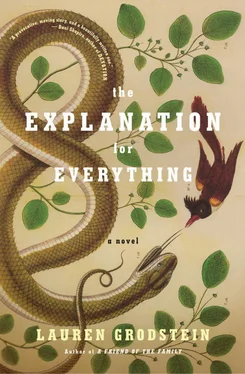“I think a better question is why would they.”
“Because that’s how evolution works. We have all evolved, mutation by mutation, from single-celled organisms that existed hundreds of millions of years ago. There’s molecular evidence. There’s proof!” And here he wished he really was Rosenblum, who always had the numbers at his disposal, the right way to recount the history of DNA.
“Your argument is so circular,” Melissa said. “Evolution exists because we’re the products of evolution.”
“Is that what I said?” He feared it was.
Melissa sighed again, but this time she seemed almost disappointed, or, far worse, compassionate. “Sometimes I think Darwinians don’t know how ridiculous they sound. Like we’re the ridiculous ones, when all you have to go on are mutations—”
“That’s not all we have to go on,” said Andy.
“ Mutations! ”
Andy, who had never before found himself mocked for holding fairly conventional beliefs, was even more annoyed with himself than usual. Why did she have to keep saying “mutations” in that tone of voice?
“So that’s why we’re here, then,” she said. “Instead of God, you choose mutants.”
“All right,” Andy said, “I get it. Enough.”
What he knew of evolution was what he’d learned as an undergraduate and applied to the rest of his research: that genes were hereditary, that mutations in those genes expressed themselves in different behaviors or traits, and that the different behaviors or traits that led to more successful reproduction were the ones that were more likely to be passed on. This was the way of life. If it wasn’t, he couldn’t conduct his research. He couldn’t teach biology.
“Here,” Melissa said, opening The Macroevolution Myth to a passage she’d highlighted in pink. “Listen, Professor Waite. Just so you can see where I’m coming from. I’m quoting: in order for supposedly ‘helpful’ mutations to randomly arise in organisms, an organism would have to wait approximately 216 million years, according to conservative estimates, to see this mutation arise. If one accepts the secular estimation that life on this planet dates back 3.5 billion years, one only has to do simple math to realize that enough time simply hasn’t occurred since life began to account for every single mutation necessary to create something as complex as the human heart, much less the brain.” She closed the book triumphantly. “See?”
“You realize this language isn’t particularly convincing,” Andy said. “What do you mean ‘conservative estimate’? What is a ‘secular estimation’?”
“Do you really want all the numbers?” Melissa asked. “I mean, there are footnotes if you want them—”
“I don’t need to see the footnotes,” he said. “I just—listen—” and here his mind went, without bidding, to his NSF grant, his mice, the volcano he and Belle were supposed to make for her presentation on North American geology, “when I said I would oversee this independent study with you, I suppose I was hoping you’d go with a different thesis.”
“Well, what thesis were you hoping for, exactly? That intelligent design is wrong? That the Great Biological Powers That Be are right because everyone says they are?” Frustration put an appealing flush in her cheeks, which Andy noted and dismissed.
“Why don’t we take out the right and the wrong,” he suggested, letting his voice grow more gentle, supportive. “How about we revise your thesis to be that intelligent design represents an alternative to Darwinian evolution that’s, I don’t know—that’s worth investigating. As opposed to what you have now, which is that it’s a better alternative. Because it’s not, and I can’t support your investigation into an untruth.”
Melissa rolled her eyes. “That just sounds flaky,” she said. “And also it’s not what I want to say. I want to talk about intelligent design. I want to make an argument for it. I want to prove that the world is simply too complex, too perfectly designed, to be a product of,” here she wrinkled her nose again, “ mutation. ”
“But you’re only saying that because the only literature you read supports your beliefs.”
“I could accuse you,” she said, “of the same thing.”
His grant was only a quarter finished, and the first part was due in a month. He hadn’t done laundry all week. Dinner, homework, the volcano.
“So are you in or are you out?”
“I don’t know,” he said, scratching his cheek.
Melissa’s face went slack with horror. “I need these credits, Professor Waite!”
“I mean, I’m in. But only because I said I was in. Not because I think you’re going to convince me that,” he picked up one of her books again, Saint Jesus of the Test Tubes, “that God is a rainbow.”
“Fine,” she said. “As long as you sign.” She bent down again to her backpack, took out a folder, removed a blue sheet of paper—the official Independent Study Faculty Agreement—and a white sheet of paper, which laid out her goals for the year: to read and analyze the following books and articles, to put together a bibliography of useful materials on intelligent design, and to write a thirty-page research paper.
“Thank you,” she said.
“No problem,” Andy lied.
She put her haul into her backpack and stood. Now that she was standing straight, Andy realized how tall she was. “You have young daughters, right, Professor Waite?”
How did she know? But the proof was all around him, in the photos tacked up to the bulletin board on his wall, the lunch sitting on his desk, packed in Rachel’s old Mulan lunch box.
“If you ever need a babysitter, you know, I love kids.”
Andy smiled. Once upon a time, he imagined, female students offered up their bodies. Now they offered up their Friday evenings. “That’s nice of you, Melissa. I don’t go out much, though.”
“Well, just in case,” she said. “And thanks for signing those papers.”
“You bet,” Andy said. As soon as she was gone, he removed Rosenblum’s letter from the drawer.
What kind of man have you become, anyway?
The kind who can’t slam-dunk a fight with a creationist. The kind who can’t prove a simple hypothesis about drunken mice.
But, he thought to himself, reading Rosenblum’s letter for the fourth, fifth, sixth time, the kind who would take on Melissa in the first place. The kind who would find the time to debate her. The kind who takes reasonable care of his girls, who’s a decent enough neighbor, who tries to be cheerful most of the time. The kind who, when he becomes too resentful about the life fate has handed him, looks in at his daughters sleeping in the same bunk and feels a renewed ability to go on.
There are worse men out there, Hank.
When he was a child in Shaker Heights he would walk to Horseshoe Lake with his mother on chilly March mornings to collect paramecia. They would each have two big jelly jars, and they would crouch by the creek and dip in their jars and collect all sorts of terrific things: paramecia and amoebas and sometimes, accidentally, tiny golden fish arching like thumbnails. They would take them back to their living room and Andy’s mother would pull out the microscope, set it down on the kitchen table. She’d make pond-water slides, stick them under the scope, adjust the magnification. There the paramecia would flutter, the hydras would bulge. Andy’s mother would turn up the magnification and suddenly Andy would be able to see the insides of the tiny creatures, the micronucleus and macronucleus, the vacuoles, the dozens of quivering cilia.
“Life exists on scales beyond our imagination,” his mother would say, her face warm next to his by the microscope.
Читать дальше












